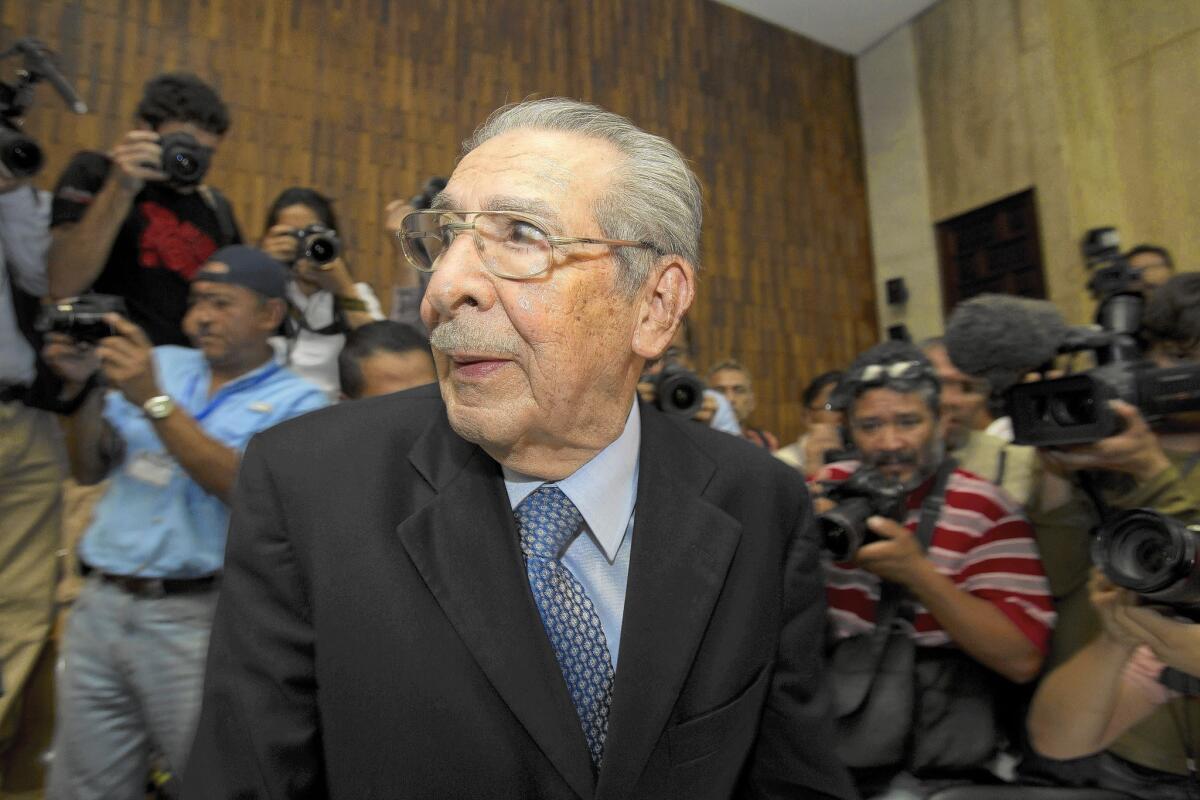Guatemala, once a leader in war-crime prosecutions, at a standstill

- Share via
Reporting from Guatemala City — For a while, Guatemala appeared to be at the global forefront of war-crimes prosecutions.
Over a six-week period last year, a notorious dictator, Efrain Rios Montt, sat in the docket, questioned by prosecutors and confronted by the survivors — mostly Maya — of systematic massacres carried out in the 1980s while he was the country’s de facto leader.
Rios Montt was found guilty of genocide and crimes against humanity, and international praise poured forth. It was the first time in the Americas that a country convicted one of its own on such charges.
Now the case is in tatters. The verdict was overturned. A new trial was ordered, maybe for some time next year. And the two women who most pushed the legal action have been shunned or sidelined.
First, Guatemala’s much-lauded attorney general and prime mover in long-ignored human rights cases, Claudia Paz y Paz, was abruptly told she would have to cut her term short. She failed in an attempt to win reelection to another four-year term and, at last report, had left the country.
Then Yassmin Barrios, the judge who presided over the high-profile Rios Montt trial, faced the wrath of a conservative legal establishment that never wanted to see the case in court. She now handles more mundane crimes, from a small office in a nondescript judiciary building in Guatemala City.
“My ideals have not changed,” Barrios said defiantly in an interview, as her bodyguards watched a soccer match on TV outside her office. “I still want justice for this society.”
The disposition of the once-promising prosecution of Rios Montt underscores the abysmal state of the judicial system in Guatemala, where some of Central America’s most egregious atrocities in the 1970s, ‘80s and ‘90s took place, but where hardly anyone has been brought to account.
To this day, Guatemala’s court system is notoriously inefficient and corrupt, the appointing process of judges riddled by political infighting and the control of big-money interests, according to a new report by the investigation group Insight Crime.
“As with all trials called on to be watershed moments, the Rios Montt case was also a judgment of the nation’s judicial system,” prominent Guatemala City newspaper Prensa Libre said in an editorial. “Undoubtedly, both opponents and defenders of the former president … consider the system unreliable. Thus, any victory becomes a pyrrhic one.”
The prosecution also revealed again the bitter division in a country that remains mostly poor, is controlled by a small group of elites and is only nominally democratic.
Many in Guatemala’s dominant right wing simply did not want the Rios Montt chapter of history revisited. They backed military action during the nation’s 35-year civil war, which ended in 1996, as a necessary if brutal campaign to obliterate leftist guerrillas.
But for the left and many indigenous communities, which make nearly half of Guatemala’s population, holding the retired general accountable was an important step toward validation and historic reckoning. The long civil war claimed about 200,000 lives, most of them indigenous peasants.
Rios Montt took power in 1982 in a military coup and was overthrown the following year, but his influence in the military and politics extended well beyond the short time he claimed the presidency.
Throughout the trial, survivors of army massacres of Ixil Maya in the early 1980s recounted horror stories of torture, rape and killing. Others, dressed in colorful textiles from their villages, crowded outside the Guatemala City courtroom to follow proceedings.
Rios Montt was 86 when, on May 10, 2013, Barrios read the verdict: guilty of genocide and crimes against humanity. Sentence: 80 years in jail.
It was a victory for Barrios, a tough-minded judge who never shied from controversial cases. She had already been honored with the annual International Women of Courage Award, bestowed by Michelle Obama. Known for her simple style, Barrios was called in one regional publication a curly-headed David fighting history. She has had bodyguards for a decade, since hand grenades landed on the patio of her home after she took on a case involving the slaying of a crusading Roman Catholic bishop.
Ten days after the Rios Montt verdict, Guatemala’s highest court overturned the ruling, saying the three-judge panel led by Barrios had made a mistake by not redoing part of the trial because of a dispute over jurisdiction.
A retrial is planned, but most jurists are apparently dodging the case.
This year, Barrios abruptly found she had been suspended from courtroom duty by the College of Attorneys, acting on a complaint by a defense attorney in the Rios Montt case. It was seen by many as a politically motivated punishment. However, it turned out that the college did not have the authority to make such a move, Barrios said, and so she was quietly restored to the bench.
“They wanted to separate me from the judiciary and send a message to other judges: Pursue the same prosecutions and this is what will happen to you,” she said.
“The important thing is we did get a genocide sentence” — if short-lived, Barrios said. “Although an injustice was done to me, I still believe in justice.”
More to Read
Sign up for Essential California
The most important California stories and recommendations in your inbox every morning.
You may occasionally receive promotional content from the Los Angeles Times.











